Claude Forthomme's Blog, page 55
May 10, 2012
Euro-crisis: What's Really Needed to Solve it
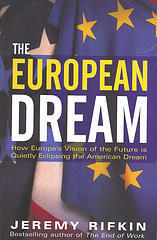
The European Dream (Photo credit: topgold)
Not a Fiscal Pact as Merkel and the Germans want it, not a Growth Pact as the new French President, Hollande and the Italian Prime Minister Mario Monti want it - even Mario Draghi, the head of the European Central Bank mentioned it (did he have a twinkle in his eye?).
What's needed is a Structural Reform Pact! Nay, more than that: a
Structural Revolution! European citizens are fed up with their political
leaders, indeed with ALL traditional political parties.
Structural reform means sending the politicians HOME (yes, we don't want to see you anymore!) and redoing everything from scratch, keeping in mind what needs to be saved: health, education, research and the protection of the poor and retired. After a lifetime of work, people have a right to an adequate pension and a dignified retirement. But it has to be adequate and not an excuse for lavish, unearned gifts!
Everything else should go overboard. One trade unionist recently mentioned on Italian TV that some 135,000 persons are involved in one way or another with politics in Italy, and sending them home would immediately save 4 or 5 billion Euros.
That would be a useful first step to straighten out the budget deficit, wouldn't it? But just a first step. You also need to streamline the civil service and cut the fat and red tape everywhere while strengthening what needs to be strengthened: training, education, incentives to innovation, support to start-ups, loans to business so they can operate etc
Sounds like a crazy Italian or Greek idea? Ok, the Greeks after their May 6th election have ended up in a corner, with each party, one after the other, giving up trying to
form a government...while Ms. Merkel, the dumb-headed German Chancellor
continues to call on austerity, saying the fiscal pact is
"non-negotiable" regardless of what is happening in Europe.

Merkel (Photo credit: stejan)
It's amazing to deny reality this way. She will only be happy
(and maybe stop talking about austerity) once Europe is on its knees and
going down the drain. Well, she can take consolation in the fact that
she is certain to enter the Gilded Halls of History as the German Chancellor who killed
Europe and the European Dream. She will have achieved what Hitler was unable to do. Brava!
Because it's not just Greece or France that is fed up
with austerity and fiscal pacts. If Hollande beat Sarkozy in the French presidential election in spite of being such a mediocre and
uncharismatic public speaker, it's because people don't want to go on
with the Merkozy governance of Europe. The vote was as much against
Sarkozy (and Merkel) as it was for Hollande - not to mention the rise in extremism,
both the revival of good old-fashioned, narrow-minded Communism
(Mélanchon with 11% of the votes) and worse, the wave of retrograde
nationalism - really chauvinism - with a hatred for Europe that has
brought Marine Le Pen's Front National to reap nearly 18% of the vote.
Italy too has its five million Italians who protest against the political system by following the comedian Beppe Grillo in his anti-party movement. Yes, five million Italians, notjust one or two.
Even in Germany people are (at last!) getting angry: just look at the
success of the Pirate Party which has entered now three regional
legislatures, averaging some 8 percent of the votes, every time
taken off from all the traditional parties (particularly from Merkel's), even
though this is a party with practically no platform other than a call
for more transparent government which, they say, in our Internet age,
should be not merely technically possible but a requirement- a must for
good governance.
Yes, people are fed up with political corruption. It takes all
forms like politicians lying and loading the dice in their favor with
extras like official cars, free travel on trains and planes, luxurious
pensions after only five years of service in Parliament (the case in Italy), double incomes when they add on representation to the European
Parliament. The Italians call their politicians "the Caste": they are untouchable, Justice cannot reach them and when they are visibly corrupt, salting away cash and jewels in Switzerland as the Lega Nord has just done, none of them go to prison. No, Bossi, the Lega Nord Secretary and Chief embezzler just lost his post as party secretary and became...Honorary President of his party! Amazing!

Italiano: Umberto Bossi (Photo credit: Wikipedia)
Then there's outright vote buying through, inter alia,
padding the civil service and pensions to satisfy family and friends. Small wonder that the Italian (and Greek) civil service is plethoric! Plus there are all sorts of disgusting little games like
giving out false invalidity certificates (especially common in the South of Italy) that gain the lucky recipients extra income and goodies like free city
parking space in front of their home. Not to mention playing the bond
market when national banks get loans from the European Central Bank at
one percent and, instead of lending to local business and help growth, you
find they turn around and buy their own national bonds that (thanks to
the crisis) pay them 6 and 7 percent or more. A nice easy, risk-free return at the expense of all of us, poor, regular taxpayers!
And all this plays out against a deepening recession and rising unemployment in Europe where the average clocked in at 10.9% in March - and close to 50% for the young in most Southern European countries...
What worries me is that we're not headed for reform. People now are talking about growth - the need to fight recession. Ok, that's a (welcome) step in the right direction but not enough. In our present circumstances, growth is not sustainable, perhaps not even possible, as long as we're weighted down by the cancer of political corruption in all its manifestations. Every law that is passed will be corrupted by the system.
I tell you, we need a REVOLUTION. We need to start anew, with people who have a demonstrated capacity for management - not just a capacity for blah-blah and hand-shaking and back-clapping which seems to be all our our politicians are good at.
If we don't move forward on the European Dream, it will collapse. Europe will fall in the hands of extremists both on the right and left, and we'll be back in the 19th century! The Europe of Nationalism...Who wants that?
Of course I'm daydreaming. This is the era of jungle capitalism, a free-for-all that ends up in the 1% against the 99%. You're good, man, if you make money. If not, well, you're a loser, and you only deserve to be a loser...
Anybody left with moral values? Anybody worries about the poor and the emarginated? Yes, I know, it's not fashionable...
Related articles
 Merkel stresses need for austerity
Merkel stresses need for austerity Eurozone crisis: Angela Merkel forced to postpone 'fiskalpakt' ratification
Eurozone crisis: Angela Merkel forced to postpone 'fiskalpakt' ratification After Elections, Europe Focuses on Growth - New York Times
After Elections, Europe Focuses on Growth - New York Times German SPD escalates euro showdown with Merkel
German SPD escalates euro showdown with Merkel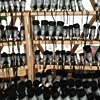 Franco-German rifts show soon after Hollande's election
Franco-German rifts show soon after Hollande's election Germany Faces Backlash Against Austerity Moves
Germany Faces Backlash Against Austerity Moves Hollande and Merkel can't save the eurozone by old methods alone
Hollande and Merkel can't save the eurozone by old methods alone Austerity is a dirty word in Europe but what next?
Austerity is a dirty word in Europe but what next? European voters reject austerity; what happens now?
European voters reject austerity; what happens now?

Published on May 10, 2012 11:37
May 7, 2012
To all my Friends Who Read 'The Blog': Sorry for the Silence!
I was hospitalized. I thought it was a routine operation and that I'd be out, as good as new, in a matter of 4 or 5 days! How wrong I was, 4 weeks have passed...so please, forgive the silence, it was quite unplanned. I realized something serious was afoot only when I was rolled into the operation room and glimpsed not one but four surgeons! My husband waited six hours for my return, and yes, as it turned out, everything worked out fine. They took the tumor out and there's no cancer anywhere else, touch wood.
I'm very lucky. And greateful to the Lord, the Giver of Life and (of course) to modern medicine. Three or four decades ago, I'm sure I wouldn't have made it. But now, the technology is so developped and risks minimized that one can truly say it's a "routine" life-saving operation.
Neither of my children really believed my spiel about the operation being routine and I was certainly happy to see my family around me as I began the recovery process. Doctors and nurses were also incredibly nice and helpful (the Italians have an amazing capacity for being very human and warm):

Recovering from the operation
I drew this cartoon that pretty much expresses the way I felt these past 4 weeks!
I won't deny that it's been a traumatizing experience but as always, with the bad comes the good. In the long nights in hospital, when you feel that the sun will never rise again, you find yourself face to face with what matters in your life. In one word: the experience has forced a reset in my life priorities.
I've gained a precious second lease on life and I don't want to mess it up! Big changes...Starting with the Internet.
(1) I love networking, blogging, FB, Twitter, Pinterest and all the rest but you know what? None of this is as important as real life. I suddenly realized I much preferred the sunshine out there to my computer screen in here. I want to see more of my friends and family, I want to travel to places where I haven't been before I die, like Istambul and Berlin and Guernsey island.
(2) Blogging vs. writing. I'm a writer first, mainly a novelist and occasionally a non-fiction writer (since I also happen to be an economist). But I'm a blogger by chance - mainly because someone said back then (I don't remember when) that a writer ought to maintain a blog. That's what publishers and literary agents expect you to do. It seems everybody believes that a blog sells books. Like everybody believes that you can sell books on Twitter. I doubt that. I don't really think there's much of a connection. Do you buy my books because you enjoy my blog? Or because I tweet about them? Let me know if you do...I'm quite willing to admit that I haven't yet bought a book on the basis of a tweet or because I enjoy someone's writing in a non-literary form (like, say, blogging). For example, I think Galbraith is a great economist, one of the best economic writers of the 20th century, but his novel is no good (he must have known that too because he never wrote another).
(3) My main objective in life: writing. Not book promotion. Ok, some of it needs to be done but I won't ever allow it to interfere again with my writing (as I've done for the past six months). No more marketing beyond what is strictly necessary...Like letting you know that I'm about to come out with a new book.
Indeed, that's what I'm going to concentrate on now: finish editing A Hook in the Sky. It's nearly done - I need another couple of months.
What's it about? Well, it's what I would like to call a "BB novel". Just like you have YA novels aimed at Young Adults, you have BB novels aimed at Baby Boomers - those 70 million Americans about to retire or that have just retired (not to mention millions in the rest of the world, particularly in the developing world where the population is aging fast). A critical period in life and a huge audience. Small wonder more and more novels (and films) seem to deal with this issue.
While in the hospital, I came across several such novels that I downloaded on my Kindle - incidentally, e-readers are a life-savior when you're stuck in a hospital bed: easy to hold in one hand, much lighter that most books and you can buy a new book when you've run out of anything to read even at 3 am, online libraries never close! And the books I read were really good: Louis Begley's About Schmidt series (the third one's just come out to excellent reviews - see the NYT), Deborah Moggach's comical The Best Exotic Marigold Hotel, Penelope Lively's deeply moving Moon Tiger or Ian McEwan's bizarre and mysterious Black Dogs.
Some of these books are more focussed on what's left at the end of a life, others on how to handle the last slice of life. My Hook in the Sky is more on the latter aspect: how to deal with that second life that unfolds after retirement. A retired very French and dapper United Nations director fancies himself a School of Paris painter to the dismay of his much younger and artsy American wife who runs a contemporary art gallery in Chelsea...You can easily imagine how his painterly activities upset the marriage. When he repairs to Paris to show his work (his wife refuses to come along), he is presented with numerous (female) temptations...Can he ever put order in his second life and save his marriage?
Well...If you enjoyed any of the writers I mentioned here (see book icons below) I'm willing to bet you'll really enjoy my Hook in the Sky (incidentally, the title is a play on the word skyhookery...)
PS If you've read any of these, do let me know what you think...



I'm very lucky. And greateful to the Lord, the Giver of Life and (of course) to modern medicine. Three or four decades ago, I'm sure I wouldn't have made it. But now, the technology is so developped and risks minimized that one can truly say it's a "routine" life-saving operation.
Neither of my children really believed my spiel about the operation being routine and I was certainly happy to see my family around me as I began the recovery process. Doctors and nurses were also incredibly nice and helpful (the Italians have an amazing capacity for being very human and warm):

Recovering from the operation
I drew this cartoon that pretty much expresses the way I felt these past 4 weeks!
I won't deny that it's been a traumatizing experience but as always, with the bad comes the good. In the long nights in hospital, when you feel that the sun will never rise again, you find yourself face to face with what matters in your life. In one word: the experience has forced a reset in my life priorities.
I've gained a precious second lease on life and I don't want to mess it up! Big changes...Starting with the Internet.
(1) I love networking, blogging, FB, Twitter, Pinterest and all the rest but you know what? None of this is as important as real life. I suddenly realized I much preferred the sunshine out there to my computer screen in here. I want to see more of my friends and family, I want to travel to places where I haven't been before I die, like Istambul and Berlin and Guernsey island.
(2) Blogging vs. writing. I'm a writer first, mainly a novelist and occasionally a non-fiction writer (since I also happen to be an economist). But I'm a blogger by chance - mainly because someone said back then (I don't remember when) that a writer ought to maintain a blog. That's what publishers and literary agents expect you to do. It seems everybody believes that a blog sells books. Like everybody believes that you can sell books on Twitter. I doubt that. I don't really think there's much of a connection. Do you buy my books because you enjoy my blog? Or because I tweet about them? Let me know if you do...I'm quite willing to admit that I haven't yet bought a book on the basis of a tweet or because I enjoy someone's writing in a non-literary form (like, say, blogging). For example, I think Galbraith is a great economist, one of the best economic writers of the 20th century, but his novel is no good (he must have known that too because he never wrote another).
(3) My main objective in life: writing. Not book promotion. Ok, some of it needs to be done but I won't ever allow it to interfere again with my writing (as I've done for the past six months). No more marketing beyond what is strictly necessary...Like letting you know that I'm about to come out with a new book.
Indeed, that's what I'm going to concentrate on now: finish editing A Hook in the Sky. It's nearly done - I need another couple of months.
What's it about? Well, it's what I would like to call a "BB novel". Just like you have YA novels aimed at Young Adults, you have BB novels aimed at Baby Boomers - those 70 million Americans about to retire or that have just retired (not to mention millions in the rest of the world, particularly in the developing world where the population is aging fast). A critical period in life and a huge audience. Small wonder more and more novels (and films) seem to deal with this issue.
While in the hospital, I came across several such novels that I downloaded on my Kindle - incidentally, e-readers are a life-savior when you're stuck in a hospital bed: easy to hold in one hand, much lighter that most books and you can buy a new book when you've run out of anything to read even at 3 am, online libraries never close! And the books I read were really good: Louis Begley's About Schmidt series (the third one's just come out to excellent reviews - see the NYT), Deborah Moggach's comical The Best Exotic Marigold Hotel, Penelope Lively's deeply moving Moon Tiger or Ian McEwan's bizarre and mysterious Black Dogs.
Some of these books are more focussed on what's left at the end of a life, others on how to handle the last slice of life. My Hook in the Sky is more on the latter aspect: how to deal with that second life that unfolds after retirement. A retired very French and dapper United Nations director fancies himself a School of Paris painter to the dismay of his much younger and artsy American wife who runs a contemporary art gallery in Chelsea...You can easily imagine how his painterly activities upset the marriage. When he repairs to Paris to show his work (his wife refuses to come along), he is presented with numerous (female) temptations...Can he ever put order in his second life and save his marriage?
Well...If you enjoyed any of the writers I mentioned here (see book icons below) I'm willing to bet you'll really enjoy my Hook in the Sky (incidentally, the title is a play on the word skyhookery...)
PS If you've read any of these, do let me know what you think...


Published on May 07, 2012 03:02
April 8, 2012
Food Adventure in Rome: Buy a Fish, Get a Recipe!
When in Rome, do as the Romans, eat fish! There are some remarkable places to buy fish. Here's one that I really like, on Via Taranto, not far from the Church of San Giovanni:

Now this place is run by Renato and his sister and they're very enterprising: they've got two more outlets in Rome near the fish markets. But they keep rather unusual hours: they are only open on four days in the week, when there are fresh arrivals: Tuesday, Wednesday, Friday and Saturday. Also, they don't shut down for lunch as other small shops do: they stay open from 7:30 am to 8:00 pm, non-stop. All rather unusual. So is their fish display:

They sell every kind, from oysters, lobsters and clams to salmon, swordfish and red snapper, plus some bizarre looking fish you'd never think were eaten by humans (like the silvery snake-like thing on the right):

They're very friendly people, those fishmongers: the woman in particular is always ready to share her recipes.
Here she's busy giving advice to a client:

So I thought I'd take the plunge and try a fish I had never eaten before. I said I wanted to boil it and asked for the best kind of fish for boiling. I was told to get a "pezzogna", a Mediterranean fish with a pink tail and huge eyes. You can see it in the picture above and here it is once I brought it home, up close:

Really big eye! It's close to 2 pounds, a good size for about 3 persons.
Now here was a fish I'm sure I've never had before and I googled it to try and figure out what it was. It turns out that this is a variety of red sea bream fished at great depths (some 600 meters) off the Campania coast - scientifically known as "pagellus bogaraveo". It has many other regional names in Italy: ochialone, occhino, mupo, rovello and besugo which is also the name it has in Spain.
Fortunately my lady fishmonger gave me her recipe for "Pezzogna in guazzetto" telling me "vedrà, è buonissimo!". "Guazzetto" is a word which indicates the fish is (metaphorically speaking) paddling in shallow water, i.e. there's plenty of cooking liquid but it's not covered in it - in short, it's not a soup.
I tried it and my fishmonger was dead right: it's absolutely outstanding! Here is how I did it. First choose a pan big enough so that your fish can lie flat in it, like the one I used here:

Put half an inch of water, salt, pepper, 4 or 5 slivers of garlic (peeled) and several red tomatoes cut in half (unpeeled), and a glass of white wine:

Cover and bring to a boil (At this stage you can also add a spoonful of olive oil if you wish, or you can do what I did, let your guests add olive oil to taste after the fish is cooked.) Once it's boiling, within a minute or so, the tomato skins can be pulled off very easily:

Now add the fish:

Cover and lower the flame so that it simmers. Leave it 15 to 20 minutes (check with a toothpick or a small fork - once the flesh near the spine moves easily, it's done). At that point, take it delicately out, along with the tomato pieces, and while you clean it, let the cooking juices boil down (by about half) so that it will have a more concentrated flavor:

Once all set in a (warmed up) serving dish, along with diced boiled potatoes, I poured the cooking juices all over it and sprinkled it all with chopped parsley. Here's the result:

Absolutely buonissimo! As you can see, I served it with olive oil on the side and white wine. This is a recipe with several advantages: very easy to do and very light on your digestion. It really brings out the taste of the fish. I'm certain it works with just any kind of fish that lends itself to boiling...
PS for my readers who live in Rome: address of the fishmonger: Via Taranto 148, tel. 06 70399456. If you shop there, be sure to ask for their cooking advice!




Now this place is run by Renato and his sister and they're very enterprising: they've got two more outlets in Rome near the fish markets. But they keep rather unusual hours: they are only open on four days in the week, when there are fresh arrivals: Tuesday, Wednesday, Friday and Saturday. Also, they don't shut down for lunch as other small shops do: they stay open from 7:30 am to 8:00 pm, non-stop. All rather unusual. So is their fish display:

They sell every kind, from oysters, lobsters and clams to salmon, swordfish and red snapper, plus some bizarre looking fish you'd never think were eaten by humans (like the silvery snake-like thing on the right):

They're very friendly people, those fishmongers: the woman in particular is always ready to share her recipes.
Here she's busy giving advice to a client:

So I thought I'd take the plunge and try a fish I had never eaten before. I said I wanted to boil it and asked for the best kind of fish for boiling. I was told to get a "pezzogna", a Mediterranean fish with a pink tail and huge eyes. You can see it in the picture above and here it is once I brought it home, up close:

Really big eye! It's close to 2 pounds, a good size for about 3 persons.
Now here was a fish I'm sure I've never had before and I googled it to try and figure out what it was. It turns out that this is a variety of red sea bream fished at great depths (some 600 meters) off the Campania coast - scientifically known as "pagellus bogaraveo". It has many other regional names in Italy: ochialone, occhino, mupo, rovello and besugo which is also the name it has in Spain.
Fortunately my lady fishmonger gave me her recipe for "Pezzogna in guazzetto" telling me "vedrà, è buonissimo!". "Guazzetto" is a word which indicates the fish is (metaphorically speaking) paddling in shallow water, i.e. there's plenty of cooking liquid but it's not covered in it - in short, it's not a soup.
I tried it and my fishmonger was dead right: it's absolutely outstanding! Here is how I did it. First choose a pan big enough so that your fish can lie flat in it, like the one I used here:

Put half an inch of water, salt, pepper, 4 or 5 slivers of garlic (peeled) and several red tomatoes cut in half (unpeeled), and a glass of white wine:

Cover and bring to a boil (At this stage you can also add a spoonful of olive oil if you wish, or you can do what I did, let your guests add olive oil to taste after the fish is cooked.) Once it's boiling, within a minute or so, the tomato skins can be pulled off very easily:

Now add the fish:

Cover and lower the flame so that it simmers. Leave it 15 to 20 minutes (check with a toothpick or a small fork - once the flesh near the spine moves easily, it's done). At that point, take it delicately out, along with the tomato pieces, and while you clean it, let the cooking juices boil down (by about half) so that it will have a more concentrated flavor:

Once all set in a (warmed up) serving dish, along with diced boiled potatoes, I poured the cooking juices all over it and sprinkled it all with chopped parsley. Here's the result:

Absolutely buonissimo! As you can see, I served it with olive oil on the side and white wine. This is a recipe with several advantages: very easy to do and very light on your digestion. It really brings out the taste of the fish. I'm certain it works with just any kind of fish that lends itself to boiling...
PS for my readers who live in Rome: address of the fishmonger: Via Taranto 148, tel. 06 70399456. If you shop there, be sure to ask for their cooking advice!


Published on April 08, 2012 09:32
April 3, 2012
Euro Crisis: The Real Victims? The Young!
Joblessness in the Euro zone reached the highest level in 15 years in February 2012, with more than 17 million people unemployed, according to Eurostat. That's 10.8 % of the labor force. The Euro crisis that started two years ago has painfully hit the young: they suffer more from unemployment than any other age group - around 45% in Spain, Portugal and Greece, and climbing elsewhere in Europe. The more you go to the south, the worse it gets, but it's pretty bad in Ireland too. Ireland was supposed to be a showcase for the effectiveness of the brave austerity measures it had taken in response to EU demands and especially from the Germans, yet it is suffering from both unemployment and (once again) emigration of its labor force.
What happened? Why is all that austerity demanded from countries in debt when their primary problem is lack of growth and unemployment? Because - starting in Germany - the whole of Northern Europe wants fiscal discipline. It refuses to pay for the laxity and corruption shown by Southern Europe.
Look at these Germans protesting against the ESM in Berlin, in front of the Bundesbank while a meeting of the Governing Council of the European Central Bank was ongoing inside to discuss measures to counter the growing European debt crisis. That was on 6 October 2011 when the President of the European Central Bank was still Jean-Claude Trichet (today we have the Italian Mario Draghi). (Image credit: Getty Images via @daylife)
(Image credit: Getty Images via @daylife)
If you read their sign, you realize they understand nothing at all about what is happening, what sort of crisis this is and what needs to be done. Their poster reads: "Family Without Debt! No to the ESM".
What is the ESM? The European Stability Mechanism, some €500 million intended to be added to the existing ESFS (European Financial Stability Facility), so that together they add up to some €700 million - considered a minimum firewall to defend the Euro.
These are people who equate private debt with public debt, as if it were the same thing and required the same kind of attention. I've blogged before about the difference between private and public debt and won't go into details here, but it is obvious that the time frame is necessarily different as are the concerned target groups. As a family you have to balance your budget every month. As a nation, you can do it over years - even generations - provided you do it responsibly and get back into balance overtime. In short, the management of a nation's debt has only very distant similarities to household debt management.
True, we are facing a humongous problem. What started as speculative attacks against the Greek sovereign debt, morphed into a deadly combination of investors' lack of confidence, a bank credit crunch and austerity measures that have strangled growth, especially in Greece. Consider what happened there: in 2011, Greek GDP shrank by 6.8% even though Greece had received bailout funds equal to 57% of its GDP. Without throwing more statistics at you, believe me, the situation is just as dire in Portugal, Spain and Ireland and not much better elsewhere in Europe. Including the UK, even though it's outside the Euro zone - but then, it has the bad luck of having a Conservative government that, going against every kind of economic evidence and good common sense, believes blindly in the virtues of austerity.
The European Central Bank's 1 trillion euros ($1.3 trillion) of three-year loans to banks that started in December 2011 has helped relieve the credit crunch. Unfortunately - and now we are three months later and the first data is coming out - it would seem that this has not yet translated into more (or enough) lending to business. Meaning no uptick in employment. Last week, the ESM was finally adopted but the total firepower achieved to defend the Euro did not win unanimous consent. Not enough according to some who would have preferred a nice round figure like one trillion, too much according to the Germans, about right according to the IMF.
Beyond the abstruse activities of central bankers, Northern Europeans feel strongly that the only medicine is austerity. And it's not just Germany. Finland's Prime Minister Jyrki Katainen recently (24 March) told journalists that "crisis management can't be outsourced to the central bank. Member states have a couple of years to take austerity measures to restore and strengthen credibility for when the operations end." Even the ECB acknowledges it can't do it on its own, that the governments have to start behaving responsibly and adopt the necessary measures.
But what measures, more austerity in the midst of a recession? Even in Germany, the outlook for the manufacturing and construction sectors is bleak. It is astonishing to see how pig-headed European politicians are. The Italians are very lucky to have Mario Monti who wants measures to jump start the economy along with the necessary fiscal discipline (his "cresci Italia" plan to stimulate growth, unveiled in January). Unfortunately he belongs to a minority. When Spain's Prime Minister Mariano Rajoy made it plain he couldn't abide the EU austerity demands and set his own deficit target at 5.8% of GDP (instead of 4.4% as required), all hell broke loose. Why couldn't he abide the EU?
Because of unemployment, that's why. Unemployment in Spain is the worst in Europe, around 24% and climbing (not to mention once again that among the young, it's one unemployed out of two). Then there's another less obvious reason (and a dangerous one): he has little control over Spanish regional governments that have gotten themselves into deep debt, yet they are responsible for delivering two of the most important government services: health and education. How Spain will sort itself out is anyone's guess.
So more pain is coming. Some people design catastrophe scenarios (see articles below) whereby Spain refuses to play the Euro bailout game and Germany opts out of the Euro rather than facing payments to help Euro partners.
Do I believe that will happen? No, not really. If Germany left the Euro, there would be hell to pay, international commerce would collapse for a start. For an export-dependent country like Germany, such a scenario is simply not credible. I'm convinced our political class will muddle through as usual. Problems will remain, half-solved. The Euro will never replace the dollar but it won't sink out of sight either.
In the end, the usual victims will pay: the young. And to think that even in good times before the 2008 Great Recession, the young had grave difficulties finding jobs: the last time job-hunting was relatively easy when you earned your university degree was back in the 1970s. Since then, it's been nothing but a nightmare.
Imagine now, even in wealthy France, some 120,000 families live in tents, trailers, even cars because they cannot afford renting an apartment. And most of them are young. Yes, the Specter of Poverty is stalking Europe...Good thing that so many tents are modern, state-of-the-arts but still nothing more than canvas...
 (Photo credit: Wikipedia)
(Photo credit: Wikipedia)
Even in Germany. Yes, that's a little known fact: Germany has done an incredibly good job of hiding its real level of unemployment. It's been touting its export model of development as the nec plus ultra growth strategy, bragging to the rest of Europe how clever it was, pretending that fiscal rectitude was the key.
What key? The facts of the situation are very different: the German export machine (BMW, Mercedez, Siemens and others) sold to China and other big emerging markets that were not hit by the 2008 recession: this had nothing to do with fiscal discipline. German unemployment went down - but it was only the effect of more jobs in the export industries, nothing else.
In reality the young continued - as in the rest of Europe - to face grave difficulties in finding jobs in line with the university degrees they'd earned. Small wonder that Germany's internal consumption continues at a low level. France has many times chided Germany for not boosting its internal consumption (among them Christine Lagarde when she was France's Finance Minister). But there's nothing Germany can do about that: people are afraid to spend their savings. They don't know how long they'll keep their job and they have to maintain other family members who either don't work or work at a minimum wage - yes, you've guessed it, the young of course.
So how did the German government manage to pull a veil over its real unemployment situation? First, there's a policy that goes by the delicate term of "Kurzarbeit" (short work) and is meant to be temporary. It serves as an alternative to layoffs in times of economic slowdown. The German government compensates up to 67% of the foregone net wages of an employee if the employer needs to cut wage costs and working time because of the slowdown, while pension and health care costs are fully met by the Federal Employment Agency. About 1.5 million jobs are covered by the scheme. Some 400,000 jobs are said to have been saved, about the equivalent of 1% unemployment. Not everyone likes the system: it is likely that it maintains some dead-weight jobs alive and slows down job reallocation.
But there's another policy less well known that ensures that the young stay locked in temporary jobs: it provides for internships and apprenticeships that sound quite attractive. They are temporary contracts (usually two years) that are practically cost-free for business while paying the employed young a minimum wage. Unfortunately there's a catch: when the contract is up, while the hope is that firms would take on the young employees permanently on their payroll, that usually doesn't happen. Simply because it makes good business sense for the employer to seek a similar cost-free contract with yet another young candidate. And if you think this game only concerns a few people, you'd be wrong: according to a program I saw on ARTE TV, it may concern up to 5 million people! In short, a whole generation is deprived of any hope for a future career. But the employment statistics look good!
Germany has been able to play this game as long as it has sold abroad and government coffers are full but now, many of its markets abroad are slowing down. Maybe the Middle East will pick up thanks to oil, but if the recession really spreads, oil prices will also go down.
So rather than worry about fiscal discipline and austerity measure, thought should be given to structural reforms to liberalize the labor market (but these are long-term) and measures to jump start the economy in the short term. Among them: fiscal incentives to small and medium-size enterprises to help them get started or continue growing; education, training and refresher courses; simplification of the bureaucracy to obtain commercial licenses; liberalization of working hours etc
Many such measures require funding from the government and when they do, every effort should be made to respect the rules of fiscal discipline - but surely some rules could be suspended for a time until the economy has started growing again. And at that point, once the "good times" are back, you apply with force every fiscal rule in the book and seek to balance the budget, but not before...And by the way, once the economy has started growing again, more tax revenues flow into government coffers: that's when it becomes a lot easier to balance the budget...Related articles Eurozone debt crisis: how Greece could exit the euro
Eurozone debt crisis: how Greece could exit the euro
 Is Germany's Euro Crisis Strategy Actually Working?
Is Germany's Euro Crisis Strategy Actually Working?
 Greece is Now Irrelevant. Watch Spain and Germany
Greece is Now Irrelevant. Watch Spain and Germany
 OECD: EU Bailout Money Must Be $1 Trillion Euros
OECD: EU Bailout Money Must Be $1 Trillion Euros
 Euro zone factory malaise spreads to core
Euro zone factory malaise spreads to core



What happened? Why is all that austerity demanded from countries in debt when their primary problem is lack of growth and unemployment? Because - starting in Germany - the whole of Northern Europe wants fiscal discipline. It refuses to pay for the laxity and corruption shown by Southern Europe.
Look at these Germans protesting against the ESM in Berlin, in front of the Bundesbank while a meeting of the Governing Council of the European Central Bank was ongoing inside to discuss measures to counter the growing European debt crisis. That was on 6 October 2011 when the President of the European Central Bank was still Jean-Claude Trichet (today we have the Italian Mario Draghi).
 (Image credit: Getty Images via @daylife)
(Image credit: Getty Images via @daylife)If you read their sign, you realize they understand nothing at all about what is happening, what sort of crisis this is and what needs to be done. Their poster reads: "Family Without Debt! No to the ESM".
What is the ESM? The European Stability Mechanism, some €500 million intended to be added to the existing ESFS (European Financial Stability Facility), so that together they add up to some €700 million - considered a minimum firewall to defend the Euro.
These are people who equate private debt with public debt, as if it were the same thing and required the same kind of attention. I've blogged before about the difference between private and public debt and won't go into details here, but it is obvious that the time frame is necessarily different as are the concerned target groups. As a family you have to balance your budget every month. As a nation, you can do it over years - even generations - provided you do it responsibly and get back into balance overtime. In short, the management of a nation's debt has only very distant similarities to household debt management.
True, we are facing a humongous problem. What started as speculative attacks against the Greek sovereign debt, morphed into a deadly combination of investors' lack of confidence, a bank credit crunch and austerity measures that have strangled growth, especially in Greece. Consider what happened there: in 2011, Greek GDP shrank by 6.8% even though Greece had received bailout funds equal to 57% of its GDP. Without throwing more statistics at you, believe me, the situation is just as dire in Portugal, Spain and Ireland and not much better elsewhere in Europe. Including the UK, even though it's outside the Euro zone - but then, it has the bad luck of having a Conservative government that, going against every kind of economic evidence and good common sense, believes blindly in the virtues of austerity.
The European Central Bank's 1 trillion euros ($1.3 trillion) of three-year loans to banks that started in December 2011 has helped relieve the credit crunch. Unfortunately - and now we are three months later and the first data is coming out - it would seem that this has not yet translated into more (or enough) lending to business. Meaning no uptick in employment. Last week, the ESM was finally adopted but the total firepower achieved to defend the Euro did not win unanimous consent. Not enough according to some who would have preferred a nice round figure like one trillion, too much according to the Germans, about right according to the IMF.
Beyond the abstruse activities of central bankers, Northern Europeans feel strongly that the only medicine is austerity. And it's not just Germany. Finland's Prime Minister Jyrki Katainen recently (24 March) told journalists that "crisis management can't be outsourced to the central bank. Member states have a couple of years to take austerity measures to restore and strengthen credibility for when the operations end." Even the ECB acknowledges it can't do it on its own, that the governments have to start behaving responsibly and adopt the necessary measures.
But what measures, more austerity in the midst of a recession? Even in Germany, the outlook for the manufacturing and construction sectors is bleak. It is astonishing to see how pig-headed European politicians are. The Italians are very lucky to have Mario Monti who wants measures to jump start the economy along with the necessary fiscal discipline (his "cresci Italia" plan to stimulate growth, unveiled in January). Unfortunately he belongs to a minority. When Spain's Prime Minister Mariano Rajoy made it plain he couldn't abide the EU austerity demands and set his own deficit target at 5.8% of GDP (instead of 4.4% as required), all hell broke loose. Why couldn't he abide the EU?
Because of unemployment, that's why. Unemployment in Spain is the worst in Europe, around 24% and climbing (not to mention once again that among the young, it's one unemployed out of two). Then there's another less obvious reason (and a dangerous one): he has little control over Spanish regional governments that have gotten themselves into deep debt, yet they are responsible for delivering two of the most important government services: health and education. How Spain will sort itself out is anyone's guess.
So more pain is coming. Some people design catastrophe scenarios (see articles below) whereby Spain refuses to play the Euro bailout game and Germany opts out of the Euro rather than facing payments to help Euro partners.
Do I believe that will happen? No, not really. If Germany left the Euro, there would be hell to pay, international commerce would collapse for a start. For an export-dependent country like Germany, such a scenario is simply not credible. I'm convinced our political class will muddle through as usual. Problems will remain, half-solved. The Euro will never replace the dollar but it won't sink out of sight either.
In the end, the usual victims will pay: the young. And to think that even in good times before the 2008 Great Recession, the young had grave difficulties finding jobs: the last time job-hunting was relatively easy when you earned your university degree was back in the 1970s. Since then, it's been nothing but a nightmare.
Imagine now, even in wealthy France, some 120,000 families live in tents, trailers, even cars because they cannot afford renting an apartment. And most of them are young. Yes, the Specter of Poverty is stalking Europe...Good thing that so many tents are modern, state-of-the-arts but still nothing more than canvas...
 (Photo credit: Wikipedia)
(Photo credit: Wikipedia)Even in Germany. Yes, that's a little known fact: Germany has done an incredibly good job of hiding its real level of unemployment. It's been touting its export model of development as the nec plus ultra growth strategy, bragging to the rest of Europe how clever it was, pretending that fiscal rectitude was the key.
What key? The facts of the situation are very different: the German export machine (BMW, Mercedez, Siemens and others) sold to China and other big emerging markets that were not hit by the 2008 recession: this had nothing to do with fiscal discipline. German unemployment went down - but it was only the effect of more jobs in the export industries, nothing else.
In reality the young continued - as in the rest of Europe - to face grave difficulties in finding jobs in line with the university degrees they'd earned. Small wonder that Germany's internal consumption continues at a low level. France has many times chided Germany for not boosting its internal consumption (among them Christine Lagarde when she was France's Finance Minister). But there's nothing Germany can do about that: people are afraid to spend their savings. They don't know how long they'll keep their job and they have to maintain other family members who either don't work or work at a minimum wage - yes, you've guessed it, the young of course.
So how did the German government manage to pull a veil over its real unemployment situation? First, there's a policy that goes by the delicate term of "Kurzarbeit" (short work) and is meant to be temporary. It serves as an alternative to layoffs in times of economic slowdown. The German government compensates up to 67% of the foregone net wages of an employee if the employer needs to cut wage costs and working time because of the slowdown, while pension and health care costs are fully met by the Federal Employment Agency. About 1.5 million jobs are covered by the scheme. Some 400,000 jobs are said to have been saved, about the equivalent of 1% unemployment. Not everyone likes the system: it is likely that it maintains some dead-weight jobs alive and slows down job reallocation.
But there's another policy less well known that ensures that the young stay locked in temporary jobs: it provides for internships and apprenticeships that sound quite attractive. They are temporary contracts (usually two years) that are practically cost-free for business while paying the employed young a minimum wage. Unfortunately there's a catch: when the contract is up, while the hope is that firms would take on the young employees permanently on their payroll, that usually doesn't happen. Simply because it makes good business sense for the employer to seek a similar cost-free contract with yet another young candidate. And if you think this game only concerns a few people, you'd be wrong: according to a program I saw on ARTE TV, it may concern up to 5 million people! In short, a whole generation is deprived of any hope for a future career. But the employment statistics look good!
Germany has been able to play this game as long as it has sold abroad and government coffers are full but now, many of its markets abroad are slowing down. Maybe the Middle East will pick up thanks to oil, but if the recession really spreads, oil prices will also go down.
So rather than worry about fiscal discipline and austerity measure, thought should be given to structural reforms to liberalize the labor market (but these are long-term) and measures to jump start the economy in the short term. Among them: fiscal incentives to small and medium-size enterprises to help them get started or continue growing; education, training and refresher courses; simplification of the bureaucracy to obtain commercial licenses; liberalization of working hours etc
Many such measures require funding from the government and when they do, every effort should be made to respect the rules of fiscal discipline - but surely some rules could be suspended for a time until the economy has started growing again. And at that point, once the "good times" are back, you apply with force every fiscal rule in the book and seek to balance the budget, but not before...And by the way, once the economy has started growing again, more tax revenues flow into government coffers: that's when it becomes a lot easier to balance the budget...Related articles
 Eurozone debt crisis: how Greece could exit the euro
Eurozone debt crisis: how Greece could exit the euro Is Germany's Euro Crisis Strategy Actually Working?
Is Germany's Euro Crisis Strategy Actually Working? Greece is Now Irrelevant. Watch Spain and Germany
Greece is Now Irrelevant. Watch Spain and Germany OECD: EU Bailout Money Must Be $1 Trillion Euros
OECD: EU Bailout Money Must Be $1 Trillion Euros Euro zone factory malaise spreads to core
Euro zone factory malaise spreads to core

Published on April 03, 2012 09:58
March 29, 2012
A Writers' Retreat in Wonderful Matera
Matera is wonderful...or very bizarre, depending on how you look at it. A World Heritage town, it's located in Southern Italy, not far from Bari, in a rather nondescript agricultural plain that has provided grain, fruit and wine since the time of the Ancient Greeks - and much before them no doubt, because Matera has one extraordinary feature: a big part of the old town, called the "Sassi", are in fact a collection of paleolithic caves. The area has been surely lived in for over 40,000 years and it shows. And now, of course, it has become a major touristic attraction, with the caves turned into highly unusual hotels.
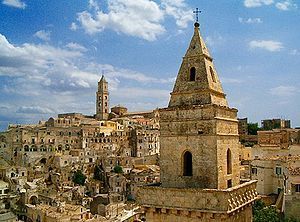 Panorama of Matera (Photo credit: Wikipedia)
Panorama of Matera (Photo credit: Wikipedia)
It is in this suggestive setting that an international group of writers recently met for a 4-day seminar without any precise agenda other than "brainstorming" their current work and future plans. This is the second year the event is held - always at the end of March - sponsored by literary agent Christine Witthohn, owner of the Book Cents Literary Agency, and author Liz Jennings. Liz also runs the hugely successful annual Women's Fiction Festival (held in Matera 27-30 September - now at its 9th edition) that attracts numerous writers from all over Europe as well as agents and editors from both the US and UK and several European countries (Germany, Netherlands). Liz is used to organizing international events and Christine to give out provocative ideas and opinions. I attended the writers' retreat (it's the second time I do) and can confirm the two of them ensured that our "brainstorming" was stimulating beyond our dreams!
Before introducing everyone - we were about a dozen writers, a perfect number to interact - and tell you what we did, I'd like to take you by the hand - or rather with my camera - as I went to my hotel in Matera on a lovely Spring afternoon, having driven past olive groves and blossoming fruit trees.
Here is the entrance to the hotel where we stayed and held our meetings, the Locanda di San Martino:

The hotel extends all the way to the top (where you see the tree) in a maze of alleys linking one room to the next, or should I say, caves. Here is an alley linking the rooms:

Fortunately there's a modern elevator, ensconced among the caves, that takes away the effort of climbing up:

All bedrooms are old caves, partly carved out in the rock - but fortunately modernized with every possible comfort, including air conditioning (this is my bedroom):

When you look at the walls of your bedroom, you can almost see the traces left behind by cavemen, in the mysterious nooks and crannies:

It's the perfect place for full immersion in Matera's Sassi (speaking of immersion, it has even a hot water spa in one of the caves).
It's also the perfect place for a writers' retreat. The night before we started our retreat, we all met in one of the town's cafés:
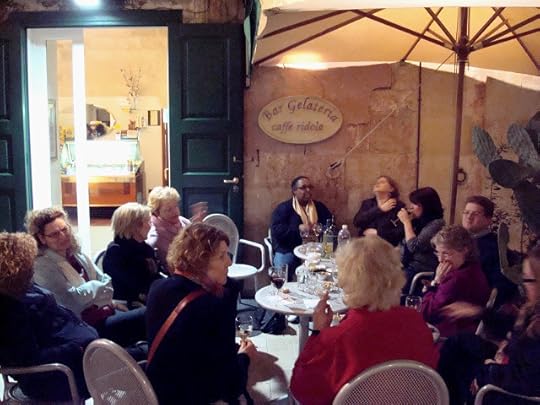
A wonderful reunion as many of us had participated in last year's brainstorming. The next morning - a beautiful day - as I walked to our meeting place in the hotel's reception area, I stopped to take this the view on my way down:

Our meeting place was equally spectacular, a succession of caves tastefully arranged. Here, in the center, you have Liz Jennings (in pink) and Christine Witthohn (in dark blue):
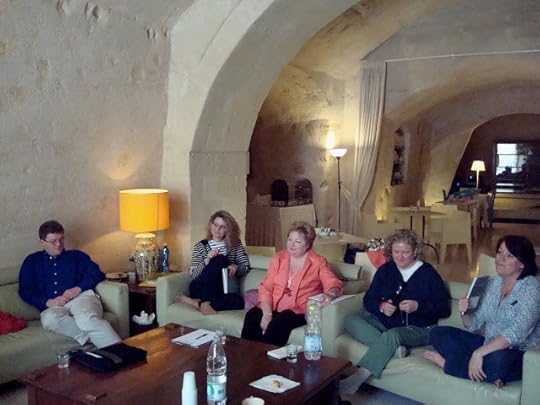
All of us are seated around in comfortable couches - each of us getting a half hour to talk about our writing (30 minutes and no more, Christine clocked us to keep us from going astray):
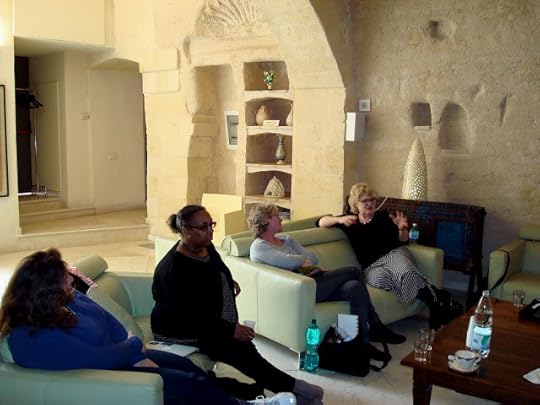
We drank water and tea and talked all day long. We also stopped for marvelous lunches at a terrace restaurant:

And never stopped talking through every meal. About what you may ask?
Consider that we were a very diverse group: some published by big traditional houses, others by small presses, yet others self-published or on their way to dip toes in self-publishing now that the stigma is off. Some were American, there was also a good English group from Oxford represented by Elizabeth Aston a.k.a. Edmondson, Anselm Audley and Eloise Aston with their recently launched Attica Books e-publishing venture specialized in mysteries, fantasy and "wit and whimsy" (light rom-com type novels). And there were foreigners too, coming from Sicily, Germany, Austria and of course myself (born Belgian - raised on three continents).
We talked about our novels and our plans - as diverse as our backgrounds, ranging from women's fiction to fantasy to romantic suspense, thrillers and more. We also touched on issues that are of particular concern to any published writer: how to market your book.
This was not mere shop talk. I know I walked away with a much clearer idea of what I should do next (publish a novel: I've got A Hook in the Sky ready - just a matter of editing, so watch for it coming out soon). Liz Jennings said she got enough ideas for three novels! And I'm sure everyone left with a feeling of having been strengthened and enriched by the attention and suggestions generously given by everyone and in particular by Christine whose long experience and deep knowledge of the publishing industry was invaluable.
In the comments below, I hope my fellow Matera brainstormers will add what they got out of our retreat. For me, it was an outstanding experience, I would rate it Triple A.
I'd like to conclude by noting that this concept of a writers' retreat, with a fexible open agenda, is (as far as I know) something very rare in the industry. You have plenty of writers' conferences where writers meet agents and editors, but they are huge affairs. No time for direct, sustained contact and exchange. All you do is pitch yourself and your novel - you don't get real feedback and moments of meditation where you can re-adjust your compass and determine exactly where you should be going.
Then, of course, at the end of every day there is magical Matera awaiting you:

A totally safe town, where people stroll about in the streets at 11 pm, stop and talk to each other - young and old, families with children, no beggars, no drunkards, no cars... A paradise!
If interested, Brainstorming in Matera is an event open to all serious writers, published, unpublished and self-published - click on this link for more information.



 Panorama of Matera (Photo credit: Wikipedia)
Panorama of Matera (Photo credit: Wikipedia)It is in this suggestive setting that an international group of writers recently met for a 4-day seminar without any precise agenda other than "brainstorming" their current work and future plans. This is the second year the event is held - always at the end of March - sponsored by literary agent Christine Witthohn, owner of the Book Cents Literary Agency, and author Liz Jennings. Liz also runs the hugely successful annual Women's Fiction Festival (held in Matera 27-30 September - now at its 9th edition) that attracts numerous writers from all over Europe as well as agents and editors from both the US and UK and several European countries (Germany, Netherlands). Liz is used to organizing international events and Christine to give out provocative ideas and opinions. I attended the writers' retreat (it's the second time I do) and can confirm the two of them ensured that our "brainstorming" was stimulating beyond our dreams!
Before introducing everyone - we were about a dozen writers, a perfect number to interact - and tell you what we did, I'd like to take you by the hand - or rather with my camera - as I went to my hotel in Matera on a lovely Spring afternoon, having driven past olive groves and blossoming fruit trees.
Here is the entrance to the hotel where we stayed and held our meetings, the Locanda di San Martino:

The hotel extends all the way to the top (where you see the tree) in a maze of alleys linking one room to the next, or should I say, caves. Here is an alley linking the rooms:

Fortunately there's a modern elevator, ensconced among the caves, that takes away the effort of climbing up:

All bedrooms are old caves, partly carved out in the rock - but fortunately modernized with every possible comfort, including air conditioning (this is my bedroom):

When you look at the walls of your bedroom, you can almost see the traces left behind by cavemen, in the mysterious nooks and crannies:

It's the perfect place for full immersion in Matera's Sassi (speaking of immersion, it has even a hot water spa in one of the caves).
It's also the perfect place for a writers' retreat. The night before we started our retreat, we all met in one of the town's cafés:

A wonderful reunion as many of us had participated in last year's brainstorming. The next morning - a beautiful day - as I walked to our meeting place in the hotel's reception area, I stopped to take this the view on my way down:

Our meeting place was equally spectacular, a succession of caves tastefully arranged. Here, in the center, you have Liz Jennings (in pink) and Christine Witthohn (in dark blue):

All of us are seated around in comfortable couches - each of us getting a half hour to talk about our writing (30 minutes and no more, Christine clocked us to keep us from going astray):

We drank water and tea and talked all day long. We also stopped for marvelous lunches at a terrace restaurant:

And never stopped talking through every meal. About what you may ask?
Consider that we were a very diverse group: some published by big traditional houses, others by small presses, yet others self-published or on their way to dip toes in self-publishing now that the stigma is off. Some were American, there was also a good English group from Oxford represented by Elizabeth Aston a.k.a. Edmondson, Anselm Audley and Eloise Aston with their recently launched Attica Books e-publishing venture specialized in mysteries, fantasy and "wit and whimsy" (light rom-com type novels). And there were foreigners too, coming from Sicily, Germany, Austria and of course myself (born Belgian - raised on three continents).
We talked about our novels and our plans - as diverse as our backgrounds, ranging from women's fiction to fantasy to romantic suspense, thrillers and more. We also touched on issues that are of particular concern to any published writer: how to market your book.
This was not mere shop talk. I know I walked away with a much clearer idea of what I should do next (publish a novel: I've got A Hook in the Sky ready - just a matter of editing, so watch for it coming out soon). Liz Jennings said she got enough ideas for three novels! And I'm sure everyone left with a feeling of having been strengthened and enriched by the attention and suggestions generously given by everyone and in particular by Christine whose long experience and deep knowledge of the publishing industry was invaluable.
In the comments below, I hope my fellow Matera brainstormers will add what they got out of our retreat. For me, it was an outstanding experience, I would rate it Triple A.
I'd like to conclude by noting that this concept of a writers' retreat, with a fexible open agenda, is (as far as I know) something very rare in the industry. You have plenty of writers' conferences where writers meet agents and editors, but they are huge affairs. No time for direct, sustained contact and exchange. All you do is pitch yourself and your novel - you don't get real feedback and moments of meditation where you can re-adjust your compass and determine exactly where you should be going.
Then, of course, at the end of every day there is magical Matera awaiting you:

A totally safe town, where people stroll about in the streets at 11 pm, stop and talk to each other - young and old, families with children, no beggars, no drunkards, no cars... A paradise!
If interested, Brainstorming in Matera is an event open to all serious writers, published, unpublished and self-published - click on this link for more information.


Published on March 29, 2012 07:25
March 26, 2012
The Video Game Society: a source of inspiration for The GREAT HACKER HEIST, a short story
With the growth of Internet, revenues in the video game industry have sky rocketed in recent years and have started to surpass the film industry. The figures are astonishing: according to the latest statistics, it is the fastest growing component of the international media sector. Growing annually at a rate of over 9%, it stood at $48.9 billion in 2011 and is expected to reach $68 billion in 2012. While precisely comparable figures for the film industry are hard to come by (depending on what you include in them - for example video/DVDs, television), there is general agreement that annual revenues from film entertainment is around $65 billion, evenly divided between the US and the rest of the world.
But one shouldn't overlook the fact that sometimes the video game industry cross-cuts with the film industry, as the release of some films lead to the creation of video games and vice versa. A recent example that comes to mind is the hugely successful Prince of Persia, but there are many others.
Ours is a society given to playing games – a video game society: we love to play, we love to be entertained at any cost…So here is a story inspired by what is fast becoming a major aspect of our digital lives. Hacker inside (Photo credit: Wikipedia)
Hacker inside (Photo credit: Wikipedia)
THE GREAT HACKER HEIST
"When I woke up, everything in the house was stolen!" The woman sobbed. "Everything!" she wailed. The lines around her mouth and on her forehead were so deep that her face looked like a Greek mask of grief.The husband, much older, didn't seem to share in her pain. He just kept patting her hand, like a father might do to calm an excitable daughter, and murmuring "my poor darling…"The policeman squared his shoulders and settled his beer belly in the armchair, reflecting that he was facing a bizarre trio: a hysterical middle-aged wife, an apparently unruffled husband, and a third rather enigmatic character, a young lawyer with close-cropped hair and a know-it-all smile. So far the lawyer hadn't said a word, beyond introducing himself and his clients. "Ma'am, I need to understand what happened…" said the policeman, his hand raised towards the computer's touch screen. The morning sunshine hit his eyes, and he got up to pull down the venetian blinds.The woman complied, without waiting for the policeman to return to his computer. "They took everything!" she said, her tinny voice rising to a crescendo. "My paintings, my carpets, my new white leather sofa. A beautiful sofa, top of the line, it cost me a bomb! And the newly installed aquarium. I hadn't even had time to buy fish for it. And the billiards table – you know, it's so convenient: it doubles as a dining table when guests are coming. All gone in one night. I tell you, they took everything!""You mean the whole house was emptied?" said the policeman, sitting down. He tapped the screen of the computer and with a graceful wave of the hand, he called up the standard form for depositions.The woman nodded, wiping her tears. "Empty. All six rooms of the house: totally empty. They didn't leave one piece of furniture behind. Just the dog. My poor sweet Muffy. He was there, all alone, walking around in the empty rooms. He was moaning. You should have seen him, his eyes drooped, his ears too, he looked so sad…" And she started crying again.The policeman sighed. He hated it when women cried like this. It made it so difficult to take their deposition down. "Was the dog hurt?" he asked."No…no, I don't think so.""And he didn't bark in the night?""No. He never barks at strangers.""Why not?""I've trained him not to!" said the woman with pride."Maybe you shouldn't have," grumbled the policeman. People were really stupid. If it didn't bark, why did they keep a dog for? "Look, Lady, let's start from the beginning," he said. "Let's go at it, one step at a time. Let me ask you. When, to the best of your knowledge, did this theft occur?""Last night.""Ok, last night, that means Thursday October 12, 2020." He tapped the date on the screen. "But let's try to pinpoint the time a little better. When did you go to bed?""I didn't look but I usually go late, after my husband. At what time did you go to bed, darling?" she asked, turning to her husband."Oh, I was tired and I went around ten, as usual," he said. The policeman wondered why he looked so grim. "But darling, you never come up with me," he added, looking yet more sombre, almost accusing. "You always stay all evening in front of your computer!""No, I don't!""Yes, you do. You must have come up around midnight," he said. "That's what you usually do. But I didn't hear you. Who knows. You might have come in even later than that.""Yes, Officer, he's right, my husband's right. I have to admit it: I'm a computer addict!" she said, with a winning smile, perhaps designed to assuage her husband's bad mood. "I…I don't know at what time I went to bed.""Right. Okay. Let's put in 12 pm," said the policeman, entering the time with a tap on the screen. "Did you notice anything strange, out of the ordinary?""Nothing." Her bright blue eyes looked straight at the policeman and he was certain she was telling the truth. Then he noticed yet another tear pearling in the corner of her eye and he hurried on with his questions. "Did you hear anything, any strange noises? Anything woke you up?" he asked.She shook her head and brought out some paper tissue to dab at her eyes."You mean they carried out all that damn furniture and you heard nothing?" He was perplexed. Amazing how soundly people manage to sleep. His own sleep was very light – at his age, he was near retirement, he had this problem with peeing. Nobody could ever have emptied his house during the night without him noticing it.She shook her head again and dabbed at her eyes some more. With all that dabbing, her eyes were becoming very red."I can't believe it! A billiards table and a sofa, these are big, heavy things!"" I know," she sighed. "And they even took my new Jacuzzi whirlpool! And the bathroom mirrors! I spent more on that bathroom than on anything else in the house!""They walked off with a Jacuzzi? You don't say!" The policeman stared at her, and at the husband and their accompanying lawyer. This really was most unusual. Fun even. He'd heard of a lot of house robberies in his time, but never one which involved unscrewing and unplugging a Jacuzzi. What with all the pipes and the electricity to cut off and the tub to carry through the door. And a whirlpool Jacuzzi had to be a damn big tub.Phenomenal."I've never heard of such a heist. These were true professionals!" he exclaimed, and a hint of admiration could be detected in his voice. "How could you have heard nothing at all?"She shook her head once more but all of a sudden she looked guilty. Ah, thought the policeman, here we come. Here's the explanation."I did make a mistake", she said. "I left my computer on.""Your computer was on?" The policeman looked at her aghast. What did that have to do with anything? Yet both her husband and the lawyer were shaking their heads knowingly. As if the computer was the thing that explained it all. That was weird."Yes," she said. "It was on. I forgot to turn it off. I never forget, but last night I forgot. My fault.""Ma'am, I wouldn't worry so much about it. I sometimes forget to turn off this office computer at night, and it's still running in the morning when I come back. And nothing's happened.""Lucky you!" she said, and started to cry again."But Ma'am, there's something I don't understand. If they took everything away, how come they didn't take your computer?""Of course they didn't. That would have been impossible.""Impossible? What do you mean?" roared the policeman. These guys were pulling his leg and he had enough of it."Officer, please, let me explain," said the lawyer. He had a soothing manner and it took all his diplomacy and tact to calm the policeman. "Mrs. Johnson is a member of DHC, the Dream House Community, a game on Facebook…""Dream House? Never heard of it," grumbled the policeman."Naturally you've heard of Facebook, haven't you?" said the lawyer, and seeing him nod, he continued. "There is a group on Facebook that plays at building their dream house. A big group actually, some fifty million people across the world. They put their dream house up with the help of virtual architects and interior designers. They plan it so that their dream house is perfect, with everything they love and dream of having, including pets. Some have cats, others have dogs, or even cheetahs, pumas and baby tigers. Nice, since they're virtual, they don't eat you up or mess your house.""Naturally," said the policeman, who hated to look stupid or uninformed. "And all the furniture people need for their dream house is acquired in virtual shops," said the lawyer, not noticing the interruption. "All the knick knacks, paintings, sculptures, curtains, rugs, everything. And some of that antique or contemporary art can be quite expensive. Because Dream House Community members have to pay for it.""Not quite" said Mrs. Johnson. "One does make money when friends come and visit the house. They have to pay an entrance fee. Quite a few people visited mine," she added proudly. "But I never earned enough. In the end, I had to put in my own money. I spent two hundred dollars to furnish my dream house! I want that money back!"The policeman looked confused. "So you have come for a two hundred dollar theft?""Either the money or you find my furniture!" said Mrs. Johnson."Find virtual furniture?" said the policeman, hesitant. His hand tapped nervously on the computer's screen. Noticing that it caused the screen to waver and blur, he took it quickly away. He couldn't think of any deposition form that would fit that kind of robbery. Good thing he was retiring next year – this was fast becoming an impossible job.
...Curious to know the end of the story? You'll find it in DEATH ON FACEBOOK, Short Stories for the Digital Age (it's the second story in the collection - eight stories in total). Click here to buy (it's only $2.99):
Footnote: I hesitated a long time about posting tidbits of my writing on my blog but then decided it was probably the way to go, seeing other writers do it regularly.
I would love to know what you think of the idea? And if you like my short story collection, can I ask you to go back to the Amazon site and click that "like" button? They help me as a writer in gaining attention on Amazon and I'm really grateful for all the help you can give me - of course, reviews are also welcome but I realize they are far more demanding on your time...
And I'm deeply grateful to those who have taken the time to write and post reviews. I have just had two new ones and they're so positive, they have warmed my poor writer's heart!
Believe me, the writer's life is a lonely one and it's wonderful to hear from one's readers...
Are you interested in what I'm up to as a writer? I just spent the last three days in wonderful Matera (that's a small, very ancient town in Southern Italy). I participated in a writers' retreat and plan to post about the experience very soon - but that's why you haven't heard from me, fellow twitterers, sorry for the silence! I was holed up in Matera discussing books with a dozen writer friends and one savvy literary agent. More on that in my next post!
Related articles [New Game] 'HEIST: The Score' Lands In The Android Market, Brings Old School Gangster Action To Your Mobile
[New Game] 'HEIST: The Score' Lands In The Android Market, Brings Old School Gangster Action To Your Mobile
 Hackers Steal $6.7M In Bank Cyber Heist
Hackers Steal $6.7M In Bank Cyber Heist
 Hacker Scouts, Kids Earn Merit Badges for Learning Modern Skills
Hacker Scouts, Kids Earn Merit Badges for Learning Modern Skills
 Video Game Potential
Video Game Potential
 Thieves pocket-dial police after video game heist
Thieves pocket-dial police after video game heist



But one shouldn't overlook the fact that sometimes the video game industry cross-cuts with the film industry, as the release of some films lead to the creation of video games and vice versa. A recent example that comes to mind is the hugely successful Prince of Persia, but there are many others.
Ours is a society given to playing games – a video game society: we love to play, we love to be entertained at any cost…So here is a story inspired by what is fast becoming a major aspect of our digital lives.
 Hacker inside (Photo credit: Wikipedia)
Hacker inside (Photo credit: Wikipedia)THE GREAT HACKER HEIST
"When I woke up, everything in the house was stolen!" The woman sobbed. "Everything!" she wailed. The lines around her mouth and on her forehead were so deep that her face looked like a Greek mask of grief.The husband, much older, didn't seem to share in her pain. He just kept patting her hand, like a father might do to calm an excitable daughter, and murmuring "my poor darling…"The policeman squared his shoulders and settled his beer belly in the armchair, reflecting that he was facing a bizarre trio: a hysterical middle-aged wife, an apparently unruffled husband, and a third rather enigmatic character, a young lawyer with close-cropped hair and a know-it-all smile. So far the lawyer hadn't said a word, beyond introducing himself and his clients. "Ma'am, I need to understand what happened…" said the policeman, his hand raised towards the computer's touch screen. The morning sunshine hit his eyes, and he got up to pull down the venetian blinds.The woman complied, without waiting for the policeman to return to his computer. "They took everything!" she said, her tinny voice rising to a crescendo. "My paintings, my carpets, my new white leather sofa. A beautiful sofa, top of the line, it cost me a bomb! And the newly installed aquarium. I hadn't even had time to buy fish for it. And the billiards table – you know, it's so convenient: it doubles as a dining table when guests are coming. All gone in one night. I tell you, they took everything!""You mean the whole house was emptied?" said the policeman, sitting down. He tapped the screen of the computer and with a graceful wave of the hand, he called up the standard form for depositions.The woman nodded, wiping her tears. "Empty. All six rooms of the house: totally empty. They didn't leave one piece of furniture behind. Just the dog. My poor sweet Muffy. He was there, all alone, walking around in the empty rooms. He was moaning. You should have seen him, his eyes drooped, his ears too, he looked so sad…" And she started crying again.The policeman sighed. He hated it when women cried like this. It made it so difficult to take their deposition down. "Was the dog hurt?" he asked."No…no, I don't think so.""And he didn't bark in the night?""No. He never barks at strangers.""Why not?""I've trained him not to!" said the woman with pride."Maybe you shouldn't have," grumbled the policeman. People were really stupid. If it didn't bark, why did they keep a dog for? "Look, Lady, let's start from the beginning," he said. "Let's go at it, one step at a time. Let me ask you. When, to the best of your knowledge, did this theft occur?""Last night.""Ok, last night, that means Thursday October 12, 2020." He tapped the date on the screen. "But let's try to pinpoint the time a little better. When did you go to bed?""I didn't look but I usually go late, after my husband. At what time did you go to bed, darling?" she asked, turning to her husband."Oh, I was tired and I went around ten, as usual," he said. The policeman wondered why he looked so grim. "But darling, you never come up with me," he added, looking yet more sombre, almost accusing. "You always stay all evening in front of your computer!""No, I don't!""Yes, you do. You must have come up around midnight," he said. "That's what you usually do. But I didn't hear you. Who knows. You might have come in even later than that.""Yes, Officer, he's right, my husband's right. I have to admit it: I'm a computer addict!" she said, with a winning smile, perhaps designed to assuage her husband's bad mood. "I…I don't know at what time I went to bed.""Right. Okay. Let's put in 12 pm," said the policeman, entering the time with a tap on the screen. "Did you notice anything strange, out of the ordinary?""Nothing." Her bright blue eyes looked straight at the policeman and he was certain she was telling the truth. Then he noticed yet another tear pearling in the corner of her eye and he hurried on with his questions. "Did you hear anything, any strange noises? Anything woke you up?" he asked.She shook her head and brought out some paper tissue to dab at her eyes."You mean they carried out all that damn furniture and you heard nothing?" He was perplexed. Amazing how soundly people manage to sleep. His own sleep was very light – at his age, he was near retirement, he had this problem with peeing. Nobody could ever have emptied his house during the night without him noticing it.She shook her head again and dabbed at her eyes some more. With all that dabbing, her eyes were becoming very red."I can't believe it! A billiards table and a sofa, these are big, heavy things!"" I know," she sighed. "And they even took my new Jacuzzi whirlpool! And the bathroom mirrors! I spent more on that bathroom than on anything else in the house!""They walked off with a Jacuzzi? You don't say!" The policeman stared at her, and at the husband and their accompanying lawyer. This really was most unusual. Fun even. He'd heard of a lot of house robberies in his time, but never one which involved unscrewing and unplugging a Jacuzzi. What with all the pipes and the electricity to cut off and the tub to carry through the door. And a whirlpool Jacuzzi had to be a damn big tub.Phenomenal."I've never heard of such a heist. These were true professionals!" he exclaimed, and a hint of admiration could be detected in his voice. "How could you have heard nothing at all?"She shook her head once more but all of a sudden she looked guilty. Ah, thought the policeman, here we come. Here's the explanation."I did make a mistake", she said. "I left my computer on.""Your computer was on?" The policeman looked at her aghast. What did that have to do with anything? Yet both her husband and the lawyer were shaking their heads knowingly. As if the computer was the thing that explained it all. That was weird."Yes," she said. "It was on. I forgot to turn it off. I never forget, but last night I forgot. My fault.""Ma'am, I wouldn't worry so much about it. I sometimes forget to turn off this office computer at night, and it's still running in the morning when I come back. And nothing's happened.""Lucky you!" she said, and started to cry again."But Ma'am, there's something I don't understand. If they took everything away, how come they didn't take your computer?""Of course they didn't. That would have been impossible.""Impossible? What do you mean?" roared the policeman. These guys were pulling his leg and he had enough of it."Officer, please, let me explain," said the lawyer. He had a soothing manner and it took all his diplomacy and tact to calm the policeman. "Mrs. Johnson is a member of DHC, the Dream House Community, a game on Facebook…""Dream House? Never heard of it," grumbled the policeman."Naturally you've heard of Facebook, haven't you?" said the lawyer, and seeing him nod, he continued. "There is a group on Facebook that plays at building their dream house. A big group actually, some fifty million people across the world. They put their dream house up with the help of virtual architects and interior designers. They plan it so that their dream house is perfect, with everything they love and dream of having, including pets. Some have cats, others have dogs, or even cheetahs, pumas and baby tigers. Nice, since they're virtual, they don't eat you up or mess your house.""Naturally," said the policeman, who hated to look stupid or uninformed. "And all the furniture people need for their dream house is acquired in virtual shops," said the lawyer, not noticing the interruption. "All the knick knacks, paintings, sculptures, curtains, rugs, everything. And some of that antique or contemporary art can be quite expensive. Because Dream House Community members have to pay for it.""Not quite" said Mrs. Johnson. "One does make money when friends come and visit the house. They have to pay an entrance fee. Quite a few people visited mine," she added proudly. "But I never earned enough. In the end, I had to put in my own money. I spent two hundred dollars to furnish my dream house! I want that money back!"The policeman looked confused. "So you have come for a two hundred dollar theft?""Either the money or you find my furniture!" said Mrs. Johnson."Find virtual furniture?" said the policeman, hesitant. His hand tapped nervously on the computer's screen. Noticing that it caused the screen to waver and blur, he took it quickly away. He couldn't think of any deposition form that would fit that kind of robbery. Good thing he was retiring next year – this was fast becoming an impossible job.
...Curious to know the end of the story? You'll find it in DEATH ON FACEBOOK, Short Stories for the Digital Age (it's the second story in the collection - eight stories in total). Click here to buy (it's only $2.99):
Footnote: I hesitated a long time about posting tidbits of my writing on my blog but then decided it was probably the way to go, seeing other writers do it regularly.
I would love to know what you think of the idea? And if you like my short story collection, can I ask you to go back to the Amazon site and click that "like" button? They help me as a writer in gaining attention on Amazon and I'm really grateful for all the help you can give me - of course, reviews are also welcome but I realize they are far more demanding on your time...
And I'm deeply grateful to those who have taken the time to write and post reviews. I have just had two new ones and they're so positive, they have warmed my poor writer's heart!
Believe me, the writer's life is a lonely one and it's wonderful to hear from one's readers...
Are you interested in what I'm up to as a writer? I just spent the last three days in wonderful Matera (that's a small, very ancient town in Southern Italy). I participated in a writers' retreat and plan to post about the experience very soon - but that's why you haven't heard from me, fellow twitterers, sorry for the silence! I was holed up in Matera discussing books with a dozen writer friends and one savvy literary agent. More on that in my next post!
Related articles
 [New Game] 'HEIST: The Score' Lands In The Android Market, Brings Old School Gangster Action To Your Mobile
[New Game] 'HEIST: The Score' Lands In The Android Market, Brings Old School Gangster Action To Your Mobile Hackers Steal $6.7M In Bank Cyber Heist
Hackers Steal $6.7M In Bank Cyber Heist Hacker Scouts, Kids Earn Merit Badges for Learning Modern Skills
Hacker Scouts, Kids Earn Merit Badges for Learning Modern Skills Video Game Potential
Video Game Potential Thieves pocket-dial police after video game heist
Thieves pocket-dial police after video game heist

Published on March 26, 2012 01:39
The GREAT HACKER HEIST - Sample a Short Story for the Digital Age
 Hacker inside (Photo credit: Wikipedia)
Hacker inside (Photo credit: Wikipedia)With the growth of Internet,revenues in the video game industry have rocketed in recent years, beating both the film and music industry. Ours is a society given to playing games – we love to play, we love to be entertained at any cost…So here is a story inspired by what is fast becoming a major aspect of our digital lives.
THE GREAT HACKER HEIST
"When I woke up, everything in the house was stolen!" The woman sobbed. "Everything!" she wailed. The lines around her mouth and on her forehead were so deep that her face looked like a Greek mask of grief.The husband, much older, didn't seem to share in her pain. He just kept patting her hand, like a father might do to calm an excitable daughter, and murmuring "my poor darling…"The policeman squared his shoulders and settled his beer belly in the armchair, reflecting that he was facing a bizarre trio: a hysterical middle-aged wife, an apparently unruffled husband, and a third rather enigmatic character, a young lawyer with close-cropped hair and a know-it-all smile. So far the lawyer hadn't said a word, beyond introducing himself and his clients. "Ma'am, I need to understand what happened…" said the policeman, his hand raised towards the computer's touch screen. The morning sunshine hit his eyes, and he got up to pull down the venetian blinds.The woman complied, without waiting for the policeman to return to his computer. "They took everything!" she said, her tinny voice rising to a crescendo. "My paintings, my carpets, my new white leather sofa. A beautiful sofa, top of the line, it cost me a bomb! And the newly installed aquarium. I hadn't even had time to buy fish for it. And the billiards table – you know, it's so convenient: it doubles as a dining table when guests are coming. All gone in one night. I tell you, they took everything!""You mean the whole house was emptied?" said the policeman, sitting down. He tapped the screen of the computer and with a graceful wave of the hand, he called up the standard form for depositions.The woman nodded, wiping her tears. "Empty. All six rooms of the house: totally empty. They didn't leave one piece of furniture behind. Just the dog. My poor sweet Muffy. He was there, all alone, walking around in the empty rooms. He was moaning. You should have seen him, his eyes drooped, his ears too, he looked so sad…" And she started crying again.The policeman sighed. He hated it when women cried like this. It made it so difficult to take their deposition down. "Was the dog hurt?" he asked."No…no, I don't think so.""And he didn't bark in the night?""No. He never barks at strangers.""Why not?""I've trained him not to!" said the woman with pride."Maybe you shouldn't have," grumbled the policeman. People were really stupid. If it didn't bark, why did they keep a dog for? "Look, Lady, let's start from the beginning," he said. "Let's go at it, one step at a time. Let me ask you. When, to the best of your knowledge, did this theft occur?""Last night.""Ok, last night, that means Thursday October 12, 2020." He tapped the date on the screen. "But let's try to pinpoint the time a little better. When did you go to bed?""I didn't look but I usually go late, after my husband. At what time did you go to bed, darling?" she asked, turning to her husband."Oh, I was tired and I went around ten, as usual," he said. The policeman wondered why he looked so grim. "But darling, you never come up with me," he added, looking yet more sombre, almost accusing. "You always stay all evening in front of your computer!""No, I don't!""Yes, you do. You must have come up around midnight," he said. "That's what you usually do. But I didn't hear you. Who knows. You might have come in even later than that.""Yes, Officer, he's right, my husband's right. I have to admit it: I'm a computer addict!" she said, with a winning smile, perhaps designed to assuage her husband's bad mood. "I…I don't know at what time I went to bed.""Right. Okay. Let's put in 12 pm," said the policeman, entering the time with a tap on the screen. "Did you notice anything strange, out of the ordinary?""Nothing." Her bright blue eyes looked straight at the policeman and he was certain she was telling the truth. Then he noticed yet another tear pearling in the corner of her eye and he hurried on with his questions. "Did you hear anything, any strange noises? Anything woke you up?" he asked.She shook her head and brought out some paper tissue to dab at her eyes."You mean they carried out all that damn furniture and you heard nothing?" He was perplexed. Amazing how soundly people manage to sleep. His own sleep was very light – at his age, he was near retirement, he had this problem with peeing. Nobody could ever have emptied his house during the night without him noticing it.She shook her head again and dabbed at her eyes some more. With all that dabbing, her eyes were becoming very red."I can't believe it! A billiards table and a sofa, these are big, heavy things!"" I know," she sighed. "And they even took my new Jacuzzi whirlpool! And the bathroom mirrors! I spent more on that bathroom than on anything else in the house!""They walked off with a Jacuzzi? You don't say!" The policeman stared at her, and at the husband and their accompanying lawyer. This really was most unusual. Fun even. He'd heard of a lot of house robberies in his time, but never one which involved unscrewing and unplugging a Jacuzzi. What with all the pipes and the electricity to cut off and the tub to carry through the door. And a whirlpool Jacuzzi had to be a damn big tub.Phenomenal."I've never heard of such a heist. These were true professionals!" he exclaimed, and a hint of admiration could be detected in his voice. "How could you have heard nothing at all?"She shook her head once more but all of a sudden she looked guilty. Ah, thought the policeman, here we come. Here's the explanation."I did make a mistake", she said. "I left my computer on.""Your computer was on?" The policeman looked at her aghast. What did that have to do with anything? Yet both her husband and the lawyer were shaking their heads knowingly. As if the computer was the thing that explained it all. That was weird."Yes," she said. "It was on. I forgot to turn it off. I never forget, but last night I forgot. My fault.""Ma'am, I wouldn't worry so much about it. I sometimes forget to turn off this office computer at night, and it's still running in the morning when I come back. And nothing's happened.""Lucky you!" she said, and started to cry again."But Ma'am, there's something I don't understand. If they took everything away, how come they didn't take your computer?""Of course they didn't. That would have been impossible.""Impossible? What do you mean?" roared the policeman. These guys were pulling his leg and he had enough of it."Officer, please, let me explain," said the lawyer. He had a soothing manner and it took all his diplomacy and tact to calm the policeman. "Mrs. Johnson is a member of DHC, the Dream House Community, a game on Facebook…""Dream House? Never heard of it," grumbled the policeman."Naturally you've heard of Facebook, haven't you?" said the lawyer, and seeing him nod, he continued. "There is a group on Facebook that plays at building their dream house. A big group actually, some fifty million people across the world. They put their dream house up with the help of virtual architects and interior designers. They plan it so that their dream house is perfect, with everything they love and dream of having, including pets. Some have cats, others have dogs, or even cheetahs, pumas and baby tigers. Nice, since they're virtual, they don't eat you up or mess your house.""Naturally," said the policeman, who hated to look stupid or uninformed. "And all the furniture people need for their dream house is acquired in virtual shops," said the lawyer, not noticing the interruption. "All the knick knacks, paintings, sculptures, curtains, rugs, everything. And some of that antique or contemporary art can be quite expensive. Because Dream House Community members have to pay for it.""Not quite" said Mrs. Johnson. "One does make money when friends come and visit the house. They have to pay an entrance fee. Quite a few people visited mine," she added proudly. "But I never earned enough. In the end, I had to put in my own money. I spent two hundred dollars to furnish my dream house! I want that money back!"The policeman looked confused. "So you have come for a two hundred dollar theft?""Either the money or you find my furniture!" said Mrs. Johnson."Find virtual furniture?" said the policeman, hesitant. His hand tapped nervously on the computer's screen. Noticing that it caused the screen to waver and blur, he took it quickly away. He couldn't think of any deposition form that would fit that kind of robbery. Good thing he was retiring next year – this was fast becoming an impossible job.
...Curious to know the end of the story? You'll find it in DEATH ON FACEBOOK, Short Stories for the Digital Age (it's the second story in the collection - eight stories in total). Click here to buy (it's only $2.99):
Footnote: I hesitated a long time about posting tidbits of my writing on my blog but then decided it was probably the way to go, seeing other writers do that regularly. I would love to know what you think of the idea? And if you like my short story collection, can I ask you to go back to the Amazon site and click that "like" button? They help me as a writer in gaining attention on Amazon and I'm really grateful for all the help you can give me - of course, reviews are also welcome but I realize they are far more demanding on your time... And I'm deeply grateful to those who have taken the time to write and post reviews. I have just had two new ones and they're so positive, they have warmed my poor writer's heart! Believe me, the writer's life is a lonely one and it's wonderful to hear from one's readers...
Are you interested in what I'm up to as a writer? I just spent the last three days in wonderful Matera (that's a small, very ancient town in Southern Italy). I participated in a writers' retreat and plan to post about the experience very soon - but that's why you haven't heard from me, fellow twitterers, sorry for the silence! I was holed up in Matera discussing books with a dozen writer friends and one savvy literary agent. More on that in my next post!
Related articles
 [New Game] 'HEIST: The Score' Lands In The Android Market, Brings Old School Gangster Action To Your Mobile
[New Game] 'HEIST: The Score' Lands In The Android Market, Brings Old School Gangster Action To Your Mobile Hackers Steal $6.7M In Bank Cyber Heist
Hackers Steal $6.7M In Bank Cyber Heist Videogame industry celebrates tax relief in Budget
Videogame industry celebrates tax relief in Budget Hacker Scouts, Kids Earn Merit Badges for Learning Modern Skills
Hacker Scouts, Kids Earn Merit Badges for Learning Modern Skills Video Game Potential
Video Game Potential

Published on March 26, 2012 01:39
March 21, 2012
How the Digital Revolution is Changing Publishing: The Good and the Bad
 Publish and Perish! publish #101 (Photo credit: mediamolecule)
Publish and Perish! publish #101 (Photo credit: mediamolecule)In the three years since the Digital Revolution started, it has already changed publishing in many ways, good and bad. It's early days to pass a final judgment, but some of the impact is already very clear.
First, the Digital Revolution has opened the doors to indies, i.e. self-published authors, bringing a measure of respectability to self-publishing. Authors found they no longer were the prey of so-called "vanity presses": they could take the jump and go to Smashwords or Amazon's KDP Select (the easiest way to do this) and several have made it big - notably Amanda Hocking, Konrath and John Locke.
That was good.
Unfortunately is had a bad result: so many would-be authors rushed to self-publish that what was once hidden from view - the infamous "slush pile", i.e. all those (often half-baked) manuscripts send in by aspiring writers to literary agents and editors - is now published for all to see.
Result? A lot of awful fiction from indies. Yet it keeps rolling out and selling, mainly because of the window of opportunity that traditional publishers have unwittingly created with the "agency model", imposing on all e-book sellers, from Apple to Amazon, a high price on e-book versions of their titles published in print. These high e-prices (generally around $15 to $17) were meant to protect the publishers' profits on printed books but opened the door to low prices for self-published authors. Indies were quick to take advantage, competing for readers by offering low prices for their books from 99 cents to a maximum of $4 or $5 - not to mention the use (and abuse) of free promotions.
The US Department of Justice has recently launched an anti-trust action that could eventually close that window of opportunity for indies, forcing traditional publishers to abandon the "agency model". When that happens, the playing field will be leveled and indies won't be able to compete with traditionally published authors merely through low prices: they will have to fight the good old fight on grounds of literary quality - not price.
Book "discoverability" is the other big victim of the Digital Revolution. Traditional publishers had book discoverability down pat, linking it to various strategies like participation in national literary awards (eg. the Pulitzer Prize), obtaining reviews in respected journals, placing books on best selling lists etc. Indies have none of these options opened to them. And in the vast and growing tsunami-like market (over a million titles so far - probably more like a million and half by the latest count), this problem will only grow more acute.
There's a lot of hype about how digital authors thanks to the Digital Revolution can at last connect directly with their readers. Sounds good but it only happens if your readers know you exist and have found your book and liked it.
There's no doubt that traditionally published authors have an advantage over indies, assuming of course trad publishers do flex their marketing muscle and organize tours, contact reviewers etc etc - but of course we know that many don't and tend to reserve their marketing efforts to their star writers and other celebs.
There's also the theory that the market will naturally weed out the bad from the good - that the good, like cream, will float to the top. This is however just a theory that still needs to be proved. There's a lot of enthusiastic talk about the digital "long tail", that books are not on shelves for a couple of months the way they used to be in physical bookstores, but that they are up on digital shelves forever (or just about).
However, being up there in the ether forever isn't going to do you any good if nobody knows you're there. The only advantage of the "long tail" is that you can plan your marketing over a much a longer time - much more than the 3 to 6 months max that is standard for traditionally printed books. Print-on-demand books of course do away with the distribution and storage problems and are theoretically much closer to e-books than to printed books (though production costs are naturally higher than for e-books that require no printing at all). So, if your books are only e-produced or PoD, you've got plenty of time to do your marketing...years even, to fill your shelf with your books, grow your blog, multiply your contacts on social media, make yourself known in reading communities, first among them Goodreads.
Time is on your side, but don't kid yourself, it could take years and years, decades even...
So far, the real winners of the Digital Revolution are mid-list authors who have decided to go digital and e-publish their back list. Compared to indies, these authors already have a name and a fan base: that gives them assurance that they will sell a minimum of books from day one. And once the ball gets rolling, it just rolls...Much to the delight of readers who have never had it so good, especially genre readers (romance and sci-fi) that have almost a limitless choice of titles at their fingertips. Oh, the joys of the Digital Revolution!
There is a way however that the Digital Revolution has made a change that could be really good for authors: it has turned short stories and novellas into lucrative market propositions. Before the Digital Revolution, short fiction was a clear non-starter: no agent or editor worth her salt would look at a short piece unless you were already a well-known author and/or a celebrity. All you could do with your short story was to sell it to a specialized magazine and hope to be paid (with luck) two or three hundred dollars.
However, with e-readers, the length of a book is not readily apparent - it doesn't really matter. Amazon was the first to realize the change and it was quick to launch its Kindle Single program with considerable success. In the 14 months the program has been running, Amazon reports it has sold more than 2 million Kindle Singles (see article below). Other publishers have followed suit - especially in the non-fiction area - and the format is gaining ground every day.
For writers, this is a bonus, a veritable God-sent. Short fiction is obviously less time-consuming to produce than a full novel. You can populate your virtual shelf with short stories and novellas, with non-fiction essays - all at "natural length" as touted by Amazon for its Kindle Singles.
But, there's a but (there always is), short fiction is not that easy to pull off. A lot of writers are more comfortable with the long form. A short story requires absolute control over every single word that goes into it. And (as I've blogged before) short stories for the Digital Age have to meet some pretty steep requirements to be successful.
Just to recap here:
1. A fast and snappy opening, a maximum of ten words to grab the reader's attention
2. A well-paced plot and a minimum of back story, enough to give the reader a clear image of who the protagonists are and why they're doing what they are doing. The suspense should never flag.
3. A surprise ending, good and short, no elaboration, the reader's imagination should be set for flying. It has to leave the reader thinking about the story and wanting to read another one.
These are demanding rules for creating model short stories. Do they cover flash fiction? Yes, but shortening should not be brought to extremes: a short story should not be so short that it leaves the reader with a feeling it is incomplete. The satisfaction of reading a short story must be total. It is successful both for what is in it and for what is not.
Why is it this way? Why can't short stories be the way they used to be, impressionistic, mood-catching, almost pieces of poetry...Well, of course, no one says they can't be that way still, but your average stressed out, multi-tasking citizen can't get immersed in it. No time for it when you stand in line at the post office, you wait for your doctor's appointment or you're catching your daily commuting train.
Also, there's something else at work: you're bombarded with news. Since you're forced to participate in this globalized world, you welcome something that will take you out of it and make you think. You need to set a distance between the daily avalanche of information and yourself:
"stop the world, I want to get off"!
That is the feeling a short fiction writer should try to address.That is the feeling I tried to address in my collection of short stories, DEATH ON FACEBOOK - subtitled and that was deliberate: Short Stories for the Digital Age.
When I read short stories, those are the rules I judged them by...Whether I've lived up to my own rules, I'll let you decide. If you want to check them out, click here to get my short story collection:
Death on Facebook, Short Stories for the Digital Age

Short fiction, in my view, is uniquely adapted to our Times and could well become the next Big-selling genre...
What is your take?
Related articles
 Outfoxing the digital revolution
Outfoxing the digital revolution Amanda Hocking, the writer who made millions by self-publishing online
Amanda Hocking, the writer who made millions by self-publishing online Research and restraint: Two more things to add to your digital publishing toolkit
Research and restraint: Two more things to add to your digital publishing toolkit Exclusive: Amazon Has Sold Over Two Million Kindle Singles
Exclusive: Amazon Has Sold Over Two Million Kindle Singles

Published on March 21, 2012 02:32
March 19, 2012
When the State Acts Like a Jungle Capitalist: How to Make Money From Collecting Taxes
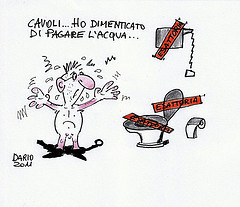 acqua privatizzata: he forgot to pay the water tax (Photo credit: vignettando con Dario Levi)
acqua privatizzata: he forgot to pay the water tax (Photo credit: vignettando con Dario Levi)Privatizing tax collection - a major State function - has been done in Italy in 2011 through Equitalia, basically a State Holding in private hands. Equitalia collects taxes on behalf of the State using a private business model that was meant to deliver superior results, the idea being that a privately managed firm would be better at collecting taxes than the stodgy and inefficient State bureaucracy.
That is the kind of ideology that is currently driving proposals to "privatize" water distribution in Italian cities, with results like in the vignette, where the poor citizen forgot to pay his water tax...
Collecting tax funds is certainly something Equitalia is good at, but it seems to be especially good at it for its own benefit. As a result of Equitalia's activities, a small priviledged group of little known private citizens have managed to make money from all the other hapless tax-paying citizens.
Talk about the 1% controlling the 99% tax-wise, and making a fortune to boot!
An Italian blogger friend of mine, Giuseppe Bonanno di Linguaglossa, decided to investigate the matter and made an eye-opening report. For those who don't read Italian, here it is in a nutshell:
1. Equitalia is managed not by one but by three management boards (for the North, Centre and South): presumably a simpler structure would not have allowed enough people to eat at the Equitalia trough;
2. Equitalia's profits shot up by over 15% in 2011, making € 67 million in profits - distributed to...who knows, we are not told in what private pockets these millions ended.
3. The President of the "Agenzie delle Entrate" (the State tax collecting structure still exists) is present on the boards of Equitalia and his accumulated yearly income is higher than that of the President of the Italian equivalent of the Supreme Court, the Corte di Cassazione, even though that should be in principle illegal: no State employee, not matter at what management level, is allowed to earn more - and certainly, as in this case, much more than Prime Minister Monti himself.
4. Equitalia, like all private enterprises, has an insurance against risk setting aside €50 million to face bankruptcy risks and now raising that sum to €190 million: in short, this is a financially solid business, and no wonder since the major risk it faces is that citizens won't pay taxes...
5. And like all so-called serious businesses, Equitalia uses an international firm, KPMG, a major US audit, tax and advisory services firm with headquarters in New York and major offices across Canada and Europe. So, in essence, Italian taxpayers are audited by a US firm...
5. For full information on the accounts of Equitalia, click here.
And below is Giuseppe Bonanno's blog post - those of you who can read Italian are in for a treat! Bottom line, this raises a serious question for Prime Minister Monti, one that Giuseppe himself asks in his blog:
What are you going to do, Professor Monti, with Equitalia? How long will it be allowed to rip off Italian taxpayers?
EQUITALIA S.p.A., Sulla pelle del cittadino EQUITALIA S.p.A. :Facendo click saprete tutto sulla gestione della S.p.A. che è una holding di Stato.
E pensare che Prodi si era dato tanto da fare per smantellare le Holding di Stato?
Fu una catastrofe! Se si riflette che per far contenta la sinistra italiana e far metterenelle mani del Compagno Colanino (ma dov'era D'Alema?) la Teleconm Italia, ha dovuto smontare tutto il Gruppo STET che dava al Tesoro le uova d'oro dei tre divedendi STET,Telecom It ed Italcable.
E poi dicono male di Putin e del suo capitalismo di Stato.

Agenzia delle Entrate Firenze Image via Wikipedia
Tra le altre cose in Equitalia ci sono tre Consigli di Amministrazione (Uno non bastava! Bisogna creare e ripartire le cariche il più possibile): Equitalia Nord, per la Lega? Equitalia Centro ( per chi?) ed Equitalia Sud per l'Agenzia dell'Entrate?
Navigando su Internet uno trova tutto; anche qualcosa di strano:infatti il Consiglio di Amministrazione di Equitalia Sud risulta così composto:
Presidente: Antonio Mastrapasqua,Vice Presidente Attilio Befera (per caso è il Direttore Generale delle Entrate ?)Amministratore Delegato Benedetto MineoPresidente Collegio Sindacale Claudio BoidoSindaco Effettivo Luigi OrlandoSindaco Effettivo Giulio PalazzoSocietà di revisione KPMG S.p.A. (Come è stato dato l'appalto?) Vedi sotto.
[image error]
KPMG N.Y.Image via Wikipedia
Ho voluto conoscere la Voce "Compensi agli Amministratori" specialmente mi sono preoccupato peril Dr. Attilio Befera che ai sensi della legge 244/2007 dovrebbe avere un obbligo per gli incarichi il cui trattamento economico supera quello di primo Presidente della Corte di Cassazione.
Ma poi qualche tempo fa spuntò sui giornali che il Presidente di Equitalia guadagna più del Presidente del Consiglio. Sarà vero?
Caro Professore Monti, ha tutta la mia comprensione: come è difficile quandosi ha come Lei, una educazione Mitteleuropea, smantellare tutto questo!
Equitalia dichiara che "attualmente non sono in vigore incarichi assoggettatialla comunicazione in oggetto". Forse perchè la struttura è una S.p.A. e quindi privatistica? Mah? E per il 2011?
Stiamo creando la via italiana alla nomenclatura di Stato?Cittadini allo strozzo! A davenì Putin!
Risultati ed andamento della gestione 2010 di Equitalia S.p.A.
"L'esercizio 2010 rileva un risultato economico positivo che conferma l'equilibrio economico dell'attività di holding di Equitalia S.p.A. (Poveri Cittadini!)
In particolare nel 2010 sono stati distribuiti dividendi per un importo di 67,1 €/mln. (A chi?).
Ci sono degli azionisti? No ? si? Saranno contenti come i Cittadini Italiani?
Quanto prende la KPMG? Ci sono incarichi di Italiani nelle sedi KPMG di N.Y o in Canada? o in Europa?
Relazione di Bilancio Equitalia 2010:
In continuità con gli scorsi esercizi, è stato effettuato un accantonamento aFondo Rischi Finanziari Generali per 50 €/mln per far fronte al rischio generale d'impresa.
Tale presidio patrimoniale risulta ora adeguato a 190 €/mln. ( Che i Cittadini non si lamentino possono contare sul rischio d'impresa! Pagate pagate e se non pagate c'è il rischio che pagate!)
Seguono gli schemi riclassificati di bilancio per margini e attività. Analisi per margini Conto Economico (Valori in €/mgl) Descrizione 31/ 12/ 2010 Dividendi 67.106 31/12/ 2009 51.393 Variazioni + 15.713 Proventi finanziari (al netto degli oneri) 1.811 Altri proventi di gestione 28.276 ,Il margine operativo lordo al 31 dicembre 2010 è pari a 54,1 €/mln. La variazione positiva del MOL è ascrivibile all'effetto combinato:- dell'incremento dei dividendi distribuiti dalle Partecipate rispetto al 2009 (+ 15,7 €/mln), che tiene conto della politica di patrimonializzazione del Gruppo; (Bel gruppetto!) dell'aumento dei costi operativi (KPMG?) riferibile ai maggiori costi sostenuti dalla Holding nella propria attività di coordinamento, con particolare riferimento alla fornitura di ulteriori servizi infragruppo nell'ambito della gestione dei progetti informatici, dei progetti di formazione e dello sviluppo del servizio centralizzato per visure a supporto dell'attività di riscossione di Gruppo. ( Un bel servizio al Cittadino!) - - - Costi operativi (spese amministrative ) E. mln per il 2010: E. mln 43.039 + E. 4.304
MARGINE OPERA TIVO LORDO (MOL) 54.154 Ammortamenti 1.255Stanziamenti a fondi rischi e oneri (1.700) MARGINE OPERA TIVO NETTO 51.199 Oneri finanziari su debiti verso cedenti 2.270 ( E poi accantonano E. mln 50 mln?)
Se volete sapere di più andate sul sito EQUITALIA S.p.A.
Un Cittadino comune si domanderebbe perchè creare questa sovrastruttura?Per avere altri posti per i Boiardi di Stato? Ma non erano scomparsi?Anche questo è un costo della nostra Casta Politica?
Ma l'Ufficio delle Entrate con tutto il personale che ha, non poteva strutturarsi da solo invece di creare altri posti di lavoro ed altri incarichi remuneratissimi?Ed i Comuni, con tutto il personale che hanno perchè non lo fanno lavorare al recupero delle somme dovute comprese le contravvenzioni per le violazioni al codice della strada?
Il Cittadino non capisce perchè e non capirà mai: i soldi dello Stato sono i suoi e non vanno in tasca agli amministratori per diritto divino.
La prossima volta parliamo delle Società dell'Energia.
For more of Giuseppe Bonanno's blog posts, click here.
Related articles(giu47furb.wordpress.com)
Altro che Beppe Grillo: per Stracquadanio"Equitalia è pizzo di Stato" | Redazione Il Fatto Quotidiano | Il Fatto Quotidiano(giu47furb.wordpress.com)
Letter bomb explodes at Italy tax office (sfgate.com)
Equitalia,Monti,diarie ai parlamentari ! Boh (giu47furb.wordpress.com)


Published on March 19, 2012 07:35
March 16, 2012
The Pleasure of a Printed Book: An Old Time Simple Joy!
We're all so deep into the Digital Age, flinging ebooks on our ereaders, that the simple pleasures of the past, like holding a printed book in your hands look quaint and old fashioned...Yet, when my novel FEAR OF THE PAST came to me yesterday through the mail, I was so happy!

Yes, I'm squinting! But that's meant to be a smile... The sun of Umbria is really hot even though we're still in March - very unusual weather this time of year...How do you like the cover? You can tell I like the color BLUE! It was printed by Amazon's Create Space and I think they did a superb job.
Here's the inside, the start of a chapter:
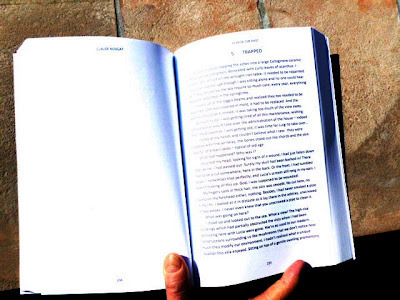
Nice print, very easy on the eyes. Yes, for the first time I felt my book was real - goes to show I'm old fashioned even though I love Internet, in particular for the ability to connect with readers - a wonderful opportunity for us writers to get out of our ivory towers...
If you're addicted to printed books (I have some close friends who are and won't touch an e-book with a ten foot pole, much less a computer), here's the link you need to purchase it:
Fear of the Past, a novel
When it opens, click "paperback" and you'll see it costs $19.99 - not much considering it's a book of some 525 pages...
But my promo is still on TODAY 16 MARCH and you're in time to get your FREE e-book version of it - until tonight 12 pm Pacific Standard Time! Click here: Fear of the Past, a novel
All this raises a question in my mind: why doesn't Amazon start a " bundling " campaign? It's well positioned to do so since Create Space is a division of Amazon. Bundling involves selling a printed book together with its digital version for a preferred price: say, in this case, $21. With one dollar more you'd get the digital version (which costs $5.99 once the promo is over). Or you could launch promos on the printed book with a free digital version attached. There are really many ways to do this...
Don't you think that would be a good idea? What's your take on launching a bundling campaign?
Related articlesIt should be 'Joy in Books', not 'Joy of Books' (thewayoftheweb.net)
More on book bundling (roughtype.com)
Why publishers should give away ebooks (roughtype.com)




Yes, I'm squinting! But that's meant to be a smile... The sun of Umbria is really hot even though we're still in March - very unusual weather this time of year...How do you like the cover? You can tell I like the color BLUE! It was printed by Amazon's Create Space and I think they did a superb job.
Here's the inside, the start of a chapter:

Nice print, very easy on the eyes. Yes, for the first time I felt my book was real - goes to show I'm old fashioned even though I love Internet, in particular for the ability to connect with readers - a wonderful opportunity for us writers to get out of our ivory towers...
If you're addicted to printed books (I have some close friends who are and won't touch an e-book with a ten foot pole, much less a computer), here's the link you need to purchase it:
Fear of the Past, a novel

When it opens, click "paperback" and you'll see it costs $19.99 - not much considering it's a book of some 525 pages...
But my promo is still on TODAY 16 MARCH and you're in time to get your FREE e-book version of it - until tonight 12 pm Pacific Standard Time! Click here: Fear of the Past, a novel

All this raises a question in my mind: why doesn't Amazon start a " bundling " campaign? It's well positioned to do so since Create Space is a division of Amazon. Bundling involves selling a printed book together with its digital version for a preferred price: say, in this case, $21. With one dollar more you'd get the digital version (which costs $5.99 once the promo is over). Or you could launch promos on the printed book with a free digital version attached. There are really many ways to do this...
Don't you think that would be a good idea? What's your take on launching a bundling campaign?
Related articlesIt should be 'Joy in Books', not 'Joy of Books' (thewayoftheweb.net)
More on book bundling (roughtype.com)
Why publishers should give away ebooks (roughtype.com)


Published on March 16, 2012 07:25



